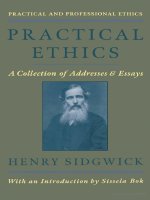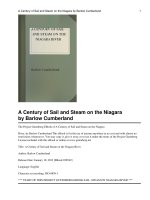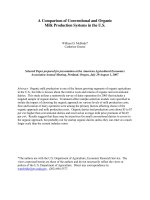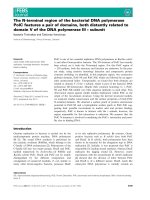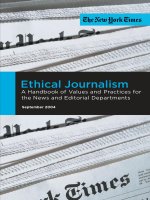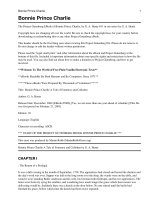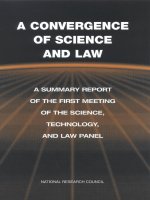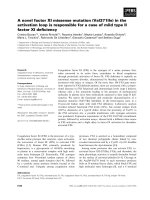The Jeans Industry - How much for a pair of Jeans and Who actually Pays
Bạn đang xem bản rút gọn của tài liệu. Xem và tải ngay bản đầy đủ của tài liệu tại đây (1.46 MB, 14 trang )
ThisarticleonJeansappearedinaneditionoftheGuardianNewspaper
TuesdayMay29,2001
TheGuardian
Just off the Buttermarket in Ipswich, in a glass‐and‐steel
mall with double doors and escalators, you will find it:
Cromwell'sMadhouse.Awide‐openjumbleofashopona
corner site, piled high with jeans, sweatshirts, casual
trousersandyetmorejeans.
And somewhere in the middle, on a dais, there they are,
underahugesignsaying:"FamousBrandsfor£19.95."Just
a pair of jeans, nestling among dozens of identical others.
Bluestonewasheddenimfive‐pocketjeans,straightleg,zip
fly. Lee Cooper LC10s, to give them their proper name.
Waist
32in,leg34,averypopularsize.
Nothing special at all. Bog‐standard, everyday, kicking‐a‐
ball‐about‐with‐the‐kids jeans. Thirtyfortysomething jeans.
Toputitbluntly,middle‐agedjeans.
"Wash inside out separately", it says on th e inside label.
100% cotton. But it doesn't say where they come from,
whichisperhapsjustaswell,forwhatwouldyouput,ifyou
really knew? "Made in Tunisia, Italy, Germany, France,
Northern Ireland,Pakistan, Turkey, Japan, Korea, Namibia,
Benin,Australia,Hungary"?
For Cromwell's Madhouse is the last stop on a jo urney
which,ifitwereputendtoend,wouldgorightaroundthe
earth and half way round again. At a very rough, very
conservative estimate, a journey of about 40,000 miles on
which components and raw materials criss‐cross the
globe
inasortofjerky,derangeddance.
Thesejeans,ourjeans,arrivedhereafewdaysagoinavan
that came up the A12 from Lee Cooper's warehouse at
Staple's Corner, just at the bottom of the M1 in north
London. There they had the Cromwell's label attached to
thembeforebeingpackagedupandpostedoff
inplentyof
timefortheweekendrush.Beforethat,theycamethrough
the Channel tunnel on a lorryfrom a similarwarehouse in
Amiens, France and before that, by boat and train from
TunisinTunisia.FromRasJebel,tobemoreprecise,agood
hour's drive north of
the city through flat Mediterranean
farmland where the fields are fat with artichokes and the
pencilcypressesswayinasurprisinglychillyspringbreeze.
You can see the red Perspex Lee Cooper sign as you
approachtheoutskirtsofRasJebel.Andit'sfittingthatyou
should,for Ras Jebel is Lee Cooperville.Somuchso that it
wouldbenosurprisetoseeasaloondoorswinginglazilyin
themiddaysun,and a
horseswishingitstailasitmunches
lazilyonanosebag.
But this is north Africa, not the wild west. A quiet, dusty,
slightly faceless town of 3,000 souls with no fewer than
threefactoriesmakingLeeCooperclothes;apresencethat
has drawn in other garment producers and spawned
textilesandsewingcoursesatthelocalcollege.
Ithasgiventheplaceawholenewdimension,accordingto
ChedlyChtourou,managingdirectorofLeeCooperTunisia.
When the first factory opened 25 years ago, he says,
womenhereusedtodressfromheadtofootinblackcloth.
Now they have their own in comes. Some of them even
wearjeans.
Ourjeanscomefromthatfirstfactory,whereeverythingis
made for export and there is a customs post on the gate.
Theothersmanufactureunderlicenseforthelocalmarket
andmakeavarietyofotherLeeCooperclothing.
Drivethroughasthesecurityguardopensthebarredmetal
gate and there is no sign of activity. Just smooth, white
wallsandan air of calm. Through double glass doors,past
thereceptionistandintoacorridorlinedwithcool,white‐
painted offices with tiled floors, where computers hum
contentedly,
wheretheringingoftelephonesseemsmuted
andwheremeninopen‐neckedshirtssmilepolitelyasthey
passbackandforthwithsheavesofpaper.
Burst through this protective layer, though, through more
double doors‐heavy wood this time‐and there is an
eyebrow‐scorchingblastof activity,heat,noise.Forherein
one huge, grey, shed‐like room is the nerve centre of the
LeeCooperempire;theengineroom;thefurnace.
Here,500womenworkfuriously,eyesdown,everymuscle
clenched. Each has her own small part to play; zips,
pockets, side‐seams, hems. And each function like an
automaton, pulling a garment from a trolley by her side,
throwing it on to her sewing machine, roaring down the
seam at full
throttle, ripping it off, throwing it back. Over
andover.Bonusesdependonit.Therearenosafetyguards
on the machines and the women concentrate hard,
keeping their fingers from the pounding needles. If they
slipup,theycanvisitthefactorynurse.
Trained machinists here take home 220 dinars a month‐
about £110, or 58p an hour. Comfortably above the legal
minimum of 47p per hour before tax, but well below the
Tunisian garment industry average of 92p per hour,
according to a study published a few years ago. If they
meet their
targets they can make another 30 dinars, or
£15,permonth.
Eight lines, each of more than 60 people, each producing
2,000 garments a day. More than three tasks per worker,
perminute,onaverage.From7.15amuntilnoon,1pmuntil
5.45pm, an hour for lunch, a maximum of two 15‐minute
toiletbreaks.Between thelinesisaseaof trolleys
draped
in hard, dark denim which stains the workers' hands blue.
Nowhere for a leg‐stretch, but then again everyone is too
busytogetuporwalkaround.Fortunately,therehasnever
beenaseriousfire.
Chedly Chtourou, a pleasant, mild‐mannered man who
seems to be universally known as Chedly, takes our jeans
and peers at the batch number on the inside label:
W002920.March162001,linenumbertwo.
Ejallah Dousab did the "English stitch", the most difficult
part,racingdownthebackseam,underthecrotchandup
to the zip, holding the legs out in her stretched handslike
thereinsofagallopinghorse.She is21andhasbeenhere
fouryears.Doesshelikeit?
ShelaughsshylyunderChedly's
gazeandsaysyes,ofcourse.Butmaybeoneday,insh'Allah,
shewillmarryandleave.
There are men working here, but mostly they're found in
the cutting and washing areas, or staring studiously at
computers in side offices. But there are so many young
women that there's a shop by the front entrance selling
sheetsandtowelsfortheirtrousseaux.Timesarechanging,
though, and some
stay on until their first child arrives, or
evenlonger.
Among these is Fasedj Sihem, who sewed the pockets on
ourjeans.A chatty,forthright30yearold,sheismarriedto
a policeman and has a 15‐month‐old son, Iheb. She has
donelotsofdifferentjobsinher14yearshere,butpockets
are a new departure for
her and she isn't fast enough to
earnabonus.
"IfIcouldI'dliketohavemyownbusiness,asmallbusiness
makingdressesforwomen.ButIneedmoremoneytostart
it. And we're going to build a house, so I have to work to
earnmoneyforthattoo,"shesays.
Althoughthefactory‐gatecostofthesejeansisjust£5and
the cost of transport to France only 10p, Fasedj isn't a bit
surprisedthattheirstandardpriceatCromwell'sMadhouse
is £29.95. Her brother lives in France and there they cost
£30‐£50.
"Youcan'tcompareoursalarieswiththesalariesinFrance
and you can't compare the prices. It isn't the same," she
explains with mild exasperation, as if speaking to a small
child.
Most of the factory's900 workers are membersofatrade
union, the Federation of Textile Workers, which is part of
the Tunisian Ge neral Workers' Union. Its representative is
Grundi Armor, who says it's not a bad place, really.
Althoughsomeoftheworkersinthefinishingarea,where
thereare
twoshifts,areangrythattheysometimeshaveto
workuntil11pmwhen10pmisthelegallimit,andsomesay
thetoiletsaretoofarawayforthemtogetthereandback
ina15‐minutebreak.
"I act as an intermediary," he says. "We always find a
solutionthat'ssatisfactorytoeveryone."Chedlylaughsand
raisesaneyebrow,mock‐weary.
Butthisfactory,thislittlecommunityofworkers,isnotthe
beginning for our pair of jeans. In one sense it's the end.
The destination. The place at which dozens of different
components, materials, goods, chemicals and sprockets,
come together in readiness for a transformation. Like the
passengers on the train
in Larkin's Whitsun Weddings, a
"frailtravellingcoincidence‐readytobeloosedwithallthe
powerthatbeingchangedcangive".
Take that hard, dark‐blue denim, for example. Kansas
denim, to give it its proper name, is brought here by land
andseafromItaldenim inMilan,600miles away,whereit
is spun and milled and dyed using synthetic indigo made
316 miles north of there in Frankfurt, Germany. At
Ras
Jebel it is cut, sewn and then altered again into a soft,
wearable fabric in huge, indu strial washers, using pumice
fromaninactivevolcanoinTurkey.
This stonewashing, by the way, is one of the dirtier
processes involved in jeans production. Although the
Italdenim factory has all the bestenvironmentally friendly
equipment, much of the dye is washed out at Ras Jebel,
which does not. The indigo itself is benign, but when it
finds its way into
local streams it cuts out the light in the
water and kills plants and fish. The pumice, replaced now
by an enzyme treatment in modern European factories,is
reducedtoapowderandthendiscarded.Afactorylikethis
canproduceseveraltonsofpowderedpumiceeveryyear.
And what of the cotton that goes to make the denim?
Italdenimbuysfromseveralsources,butmainlyfromBenin
in west Africa. So after travelling some 2,700 miles north,
toMilan,thiscottontravelsseveralhundred milesbackto
Tunis before setting off north again on its journey to
England.
Benin is one of several cotton‐growing countries in west
Africa,andthereis a permanent carnivalair.Here,parrot‐
bright robes make a blessed change from the drab
Americancast‐offsthatdresstherestofthecontinent.But
acloserlookatBenin'scottonindustry,themainstayofits
economy, is not so cheering. Corruption and
mismanagementkeepmostcotton‐farmershereaspooras
when France introduced the crop to the region 100 years
ago. And where a little technology filters down, in
insecticides and fertilisers, people are dying. During last
year's cotton season here, about 100 people
died from
poisoning thanks to the pesticide endosulfin, one of a
number of dangerous chemicals being dumped on west
Africa's cotton‐growers, despite being banned by some
wealthier countries. Calliope, the French company that
supplies the chemical, points out thatendosulfin is widely
used in Australia‐where cotton is grownon
vast prairies,
miles from other foodstuffs. Benin's cotton farms are of a
differentorder.
OnNestorZinkponon'sthreehectaresinthevillageofSaklo
Agoume, central Benin, Atingounon Desire Souo, 45, is
hoeingcotton‐drillsintheheatoftheday.Bentdouble,he
inches along the field, ladling th e soil aside to leave a
shallowtrench.Sandy,redearthcovershimentirely,except
where
rivulets of sweat carry it away. Souo has two
hectares of his own, but the soil has become sodegraded
through decades of cotton‐growing that it no longer
supports him and his three sons. He starts work before
light, collecting discarded wads of cotton seed to fertilise
his fields.
At sunrise, he goes to workfor Zinkponon in an
effort to keep his boys at school in the nearby town of
Bohicon."I'dlikethemtobeimportantmen,notfarmers,"
hesays.
Between the cotton crop, there are spindly coconut and
orange trees, and tiny plots of groundnut and cassava. It
would beimpossible to spray onecrop and notthe other.
Zinkponon, 33, says a lot of people became ill after using
endosulfin,butnoneonhisland.Allthesame,he
prefersto
leavethesprayingtohisemployees.Atthebusiesttimesof
the season, sowing and picking, 48 people work in these
fields for about 60p a day. This outlay leaves Zinkponon
dangerouslyexposedbyapoorharvest.Lastyear,theearly
rains failed and his freshly sprinkled fertiliser
blew away.
Consequently,hemadejust£15profitfromone‐and‐a‐half
tonnes of cotton‐enough to buy one leg of a pair of Lee
CooperLC10s.
Theonly way to make cashoutofcottonistohaveplenty
of family members working for free, says Zinkponon, who
hastwowivesbutonlyoneson:"Somefarmershavesixor
eight wives." According to the UN Children's Fund, the
north‐centralcottonareasaretheonlyparts
ofBeninfrom
which children are not trafficked to the region's wealthier
countries.They also have the highest school dropout rates
inBenin.Allthechildrenareneededinthefields.
Benin'scottonmarketingboard,LaSocieteNationalpourla
Promotion Agricole, is tailor‐made to rob the small
producer, Zinkponon says. Corrupt government officials
routinely keep small farmers' payment for themselves.
"Then when you can't pay for the fertilisers you've used,
they seize your land or whatever you have, your bicycle
maybe," he says. Back in Tunis, though, the denim that
comesfromBeninisn'ttheonlycottonbeingusedtomake
our jeans. There's the pocketing, grown in Pakistan or
Korea,milledandheat‐treatedinPakistan.There'salsothe
cottoncoatingonsomeofthepolyesterthreads,whichis
a
wholestoryinitself.
CoatsViyellamakesthesethreadsandtheymayalllookthe
sametoyouorme,apartfromtheirorange,whiteor blue
colouring, but there are different thicknesses, different
strengths, for different parts of the job. They get made in
Lisnaskea,inNorthernIreland,aswellasinHungaryand
in
Turkey.They get dyedin Spain and woundontospoolsin
TunisbeforebeingdeliveredtoRasJebel.
The polyester fibre which gives the thread its strength is
bought by the company from Japan, where it is
manufacturedfrompetroleumproducts.Asisthepolyester
tapeforthezip,whichcoincidentallyismadeinFrancebya
Japanesecompany,YKK.Thebrasswirethatmakesupthe
teethof
thezipcomesfromJapan,too.
Back, then, to Africa, to southern Africa this time, where
thecentreoftheNamibiancopperindustryisatTsumeb,in
thenorth.Herethemineandsmelter havejustre‐opened
afteratwo‐yearclosurethatfollowedastrike.Thetownis
breathingasighofreliefatthe
returnofitsmainindustry.
But there is a downside, according to Derek Sherratt, a
community centre manager from Chesterfield in
Derbyshire who spent two years in Namibia as a VSO
beekeeperandwhonowkeepsahouseinTsumeb,visiting
regularly with his Namibian wife Saima. The town could
earnmuchmoreforitsvaluable
mineralresourceifitcould
make things from it, ornaments for tourists perhaps,
insteadofexportingitasraw"blistercopper",hesays.
And there's the vexed question of what's in the air.
Sherratt passed on his beekeeping skills to a local family
while he was living in Namibia, but the bees kept dying.
Afterthemineclosed,though,themunicipalityhadtrouble
keeping them under control. They kept forming nests at
the top
of the lamp‐posts, making bulb‐changes a
hazardousbusiness.
"It seems they had been falling fo ul of the pollution from
the mine. There are some strong pollutants such as
arsenic," he explains. He hasn't checked on their welfare
since the mine reopened, but already there are concerns
about the effects of pollution on the human population.
Some of the miners
who worked in the mine before the
closure are planning to sue its former owner for severe
lungdamage,accordingtotheNamibiannewspaper.
Butdespitethis,Tsumebisdelightedtoseeitsmineopen
again. Coincidentally, the town is twinned with
Chesterfield,atownthatknowsonlytoowelltheeffectsof
pitclosures.
"It'sadifficultsubjectbecauseit'seasytobeintheUKand
to be concerned about environmental issues, which I am.
But when hundreds of people are without jobs,and when
thatmeanstheygetnomoneywhatsoever,consideringthe
environmentseemslikealuxury,"Sherrattsays.
So, who will buy our jeans? Sherratt and the other
members of the Chesterfield Tsumeb Association?
Maybe, maybe not.
"I'd like to consider myself a spot-on sort of person, but
sometimes, without giving it much thought, I just buy
the cheapest," he says. "I suppose I don't really
consider myself part of the designer jeans market."
Back in Ipswich it's 5.30pm and Cromwell's Madhouse
is closing for the night, the sound of its grey metal
shutters reverberating around the mall as they crash to
the floor one by one. And inside, in the middle, on a
pile under a sign saying "Famous Brands for £19.95",
Ejallah's English stitch, Fasedj's pockets, maybe even
a little of Zinkponon's cotton, sit silently waiting for their
journey to end.
It takes about 1.6 meters of denim fabric, several
hundred meters of sewing thread, 6 rivets, 1 or 5 jeans
buttons, 4 labels (usually imitation leather), and
optionally a zipper to make a pair of jeans. An average
jeans factory can make about 2.500 pair of jeans per
day.
A stonewash for 150 pairs of jeans takes 150 kilos of
pumice stone and more than 750 liters of water.
Depending on how faded the look will have to be, they
will be washed somewhere between 30 minutes and 6
hours.
Theseimagesarefrom />
Brass rivets
made from
Namibian
copper and
Australian zinc
Thread from
Lisnaskea in
Northern
Ireland
Zip teeth made
in Japan
Sewn up by
21year old
Ejallah in
Tunisia for
58p per hour
Dyed in Milan
using synthetic
German indigo
Cotton from
Benin where
pickers earn
60p a day
Stonewashed
using pumice
from Turkey
You may think your jeans came from the high
street but these ones travelled 40,000 miles
before you were able to purchase them.
Workshop: The Jeans Game
Itusedtobethat youjust walked into a shopandboughtsomethingwithoutsparingathoughtforwhereitcamefrom,or
who'dmadeit.Nowthereis a growingawarenessofworkingpracticesandethics.Toillustratesomeoftheenvironmental,
socialandeconomicfactorsthatweshould
takeintoconsiderationwhenmakingpurchases,wewilllookatthemanufacture
ofjeans,inthiscaseLeeCooperLC10s:blue,straightleg,stonewasheddenimwithazipfly.Bogstandard,everyday,kicking‐a‐
ball‐about‐with‐the‐kidsjeans.
"Washinsideoutseparately",itsayson the inside label, “100% cotton”.Butitdoesn'tsaywheretheycomefrom,whichis
perhapsjustaswell,forwhatwouldyouput,ifyoureallyknew?"MadeinTunisia,Italy,Germany,France,NorthernIreland,
Pakistan,Turkey,Japan,Korea,Namibia,Benin,Australiaand
Hungary"?
Theshopyou’vejustpurchasedthejeansfromisthelaststoponajourneywhich,ifitwereputendtoend,wouldgoround
theearthoneandahalftimes!Ataveryrough,conservativeestimate,ajourneyofabout40,000milesonwhichcomponents
andrawmaterials
criss‐crosstheglobeinasortofjerky,derangeddance.
Thejeansarrivedhere afewdaysagoinacontainerthatcame fromLeeCooper'swarehouseatStaple'sCorner, just atthe
bottomoftheM1innorthLondon.Theretheyhadtheshoplabelattachedtothembeforebeingpackagedupandpostedoff
in plenty of time for
the weekend rush. Before that, they came through the Channel tunnel on a lorry from a similar
warehouseinAmiens,Franceandbeforethat,byboatandtrainfromRasJebelinTunisia.
ThefactoryinRasJebel,withitscommunityofworkers,isnotthebeginningforourpairofjeans.Inonesenseit’stheend,
thedestination,theplaceatwhichdozensofdifferentcomponents,materials,goods,chemicalsandsprocketscometogether
inreadinessfortransformation.
Takethathard,dark‐bluedenim,forexample.Kansasdenim,togiveititspropername,isbroughtherebylandandseafrom
ItaldeniminMilan,600milesaway,whereitisspun,milledanddyedusingsyntheticindigomade316milesnorthoftherein
Frankfurt,Germany.AtRas
Jebelitiscut,sewnandthenalteredagainintoasoft,wearablefabricinhuge,industrialwashers,
usingpumicefromaninactivevolcanoinTurkey.
Thisstonewashing,bytheway,isoneofthedirtierprocessesinvolvedinjeansproduction.AlthoughtheItaldenimfactoryhas
allthebestenvironmentallyfriendlyequipment,muchofthedyeiswashedoutatRasJebel,whichdoesnot.Theindigoitself
isbenign,butwhenitfindsitswayinto
localstreamsit cutsoutthelightinthewaterandkills plantsandfish.The pumice,
replacednowbyanenzymetreatmentinmodernEuropeanfactories,isreducedtoapowderandthendiscarded.Afactory
likethiscanproduceseveraltonsofpowderedpumiceeveryyear.
And what of thecottonthatgoesto make the denim? Italdenimbuysfromseveral sources, but mainly from Benin in west
Africa.Soaftertravellingsome2,700milesnorth,toMilan,thiscottontravelsseveralhundredmilesbacktoRasJebelbefore
settingoffnorthagainonitsjourneyto
England.
BackinRasJebel,though,thedenimthatcomesfromBeninisn'ttheonlycottonbeingusedtomakeourjeans.There'sthe
pocketing,grown in Pakistan or Korea,milled andheat‐treated in Pakistan. There's also the cotton coating on some of the
polyesterthreads,whichisawholestory
initself.
Thesethreadsmayalllookthesametoyouorme,apartfromtheirorange,whiteorbluecolouring,buttherearedifferent
thicknessesandstrengths,fordifferentpartsofthejob.TheygetmadeinLisnaskea,inNorthernIreland,aswellasinHungary
andinTurkey.Theygetdyed
inSpainandwoundontospoolsinTunis,TunisiabeforebeingdeliveredtoRasJebel.
ThepolyesterfibrewhichgivesthethreaditsstrengthisboughtbythecompanyfromJapan,whereitismanufacturedfrom
petroleumproducts.Asisthepolyestertapeforthezip,whichcoincidentallyismadeinFrancebyaJapanesecompany,YKK.
Thebrasswirethatmakesuptheteethof
thezipcomesfromJapan,too.
Brass,ofcourse,is an alloy mademainlyofcopperwithalittlezinc. And it is brass,again,thatgoes to maketherivetsand
part of the buttons. They come from Prym, a German‐based firm that makes its own brass using zinc from Australia and
copperfromNamibia.
This workshop makes you think about the everyday items that you purchase.
Beninisoneofseveralcotton‐growingcountriesinwestAfrica,andthereis
apermanentcarnivalair.Here,parrot‐brightrobesmakeablessedchange
fromthedrabAmericancast ‐offsthatdresstherestofthecontinent.Buta
closer lookat Benin'scotton industry,the mainstayof itseconomy, isnot
so cheering. Corruption and mismanagement keep most cotton‐farmers
here as pooras whenFrance introducedthe crop to theregion 100years
ago. Andwhere a little technologyfilters down,in insecticidesand fertilizers,people aredying. During
lastyear'scottonseasonhere,about100peoplediedfrompoisoningthankstothepesticideendosulfin,
oneofanumberofdangerouschemicalsbeingdumpedonWestAfrica'scotton‐growers,despitebeing
banned by some wealthier countries. Calliope, the French company that supplies the chemical, points
outthatendosulfiniswidelyusedinAustralia‐wherecottonisgrownonvastprairies,milesfromother
foodstuffs.Benin'scottonfarmsareofadifferentorder.
Benin
–
Cotton
Making
KeyFacts
• ThecottonindustryisthemainstayoftheBenineconomy(70%).
• CorruptionandmismanagementkeepfarmerslikeSamuelpoor.
• Theuseofinsecticides(bannedinmanycountries)poisonspeople,theirfoodandthelocalwildlife.
• Growingcottonrequiresalotofwaterandtheindustry
isparticularlysusceptibletoclimatechange.
• Treesareremovedtobringmoresuntothecottoncropturningthelandtodesert.
• Lastyearbecauseofapoorharvesthemadejust£15fromoneandahalftonnesofcotton(enoughtobuyone
legofa
pairofLeeCoopers)
Whatexternalfactorscouldaffectthecottonindustry?
Samuel Oketola
On Nestor Zinkponon's three hectares in the village of Saklo Agoume, central Benin, Samuel Oketola, 45, is hoeing
cotton‐drills in the heat of the day. Bent double, he inches along the field, ladling the soil aside to leave a shallow
trench.Sandy,redearthcovershimentire ly, exceptwhererivuletsofsweatcarryitaway.Samuelhastwohectaresof
hisown,butthesoilhasbecomesodegradedthroughdecadesofcotton‐growingthat itnolongersupportshimand
histhreesons.Hestartsworkbeforelight,collectingdiscardedwadsofcottonseedtofertilisehisfields.Atsunrise,he
goestoworkforZinkpononinanefforttokeephisboysatschoolinthenearbytownofBohicon."I'dlikethemtobe
importantmen,notfarmers,"hesays.
Between the cotton crop, there are spindly coconut and orange trees, and tiny plots of groundnut and cassava. It
would be impossible tospray one cropand not theother.Zinkponon, 33, says a lot ofpeoplebecame ill after using
endosulfin,butnoneonhisland.Allthesame,hepreferstoleavethesprayingtohisemployees.Atthebusiesttimes
ofthe season,sowing and picking, 48 people work inthese fields forabout 60p a day. Thisoutlayleaves Zinkponon
dangerouslyexposedbyapoorharvest.Lastyear,theearlyrainsfailedandhisfreshlysprinkledfertilizerblewaway.
Consequently,hemadejust£15profitfromone‐and‐a‐halftonnesofcotton‐enoughtobuyonelegofapairofLee
CooperLC10s.
Theonlyway tomakecashoutofcottonistohaveplentyoffamilymembersworkingforfree, saysZinkponon,who
has two wives but only one son: "Some farmers have six or eight wives." According to the UN Children's Fund, the
north‐centralcottonareasaretheonlypartsofBeninfrom whichchildrenarenottraffickedtotheregion'swealthier
countries.TheyalsohavethehighestschooldropoutratesinBenin.Allthechildrenareneededinthefields.
Benin's cotton marketing board, La Societe National pour la Promotion Agricole, is tailor ‐made to rob the small
producer,Zinkpononsays.Corruptgovernmentofficialsroutinelykeepsmallfarmers'paymentforthemselves."Th e n
whenyoucan'tpayforthefertilizersyou'veused,theyseizeyourlandorwhateveryouhave,yourbicyclemaybe,"he
says.
The centre of the Namibian copper industry is at Tsumeb, in the north.
Here the mine and smelter have just re‐opened after a two‐year closure
thatfollowedastrike.Thetownisbreathingasighofreliefatthereturnof
its main industry. But there is a downside, according to Derek Sherratt, a
communitycentremanagerfromChesterfieldinDerbyshirewhospenttwo
years in Namibia as a VSO beekeeper and who now keeps a house in
Tsumeb,visitingregularlywithhisNamibianwifeSaima.Thetowncouldearnmuchmoreforitsvaluable
mineralresourceifitcouldmakethingsfromit,ornamentsfortouristsperhaps,insteadofexportingitas
raw"blistercopper",hesays.
And there's the vexed question of what's in the air. Sherratt passed on his beekeeping skills to a local
family while he was living in Namibia, but the bees kept dying. After the mine closed, though, the
municipality had trouble keepingthem under control.They keptforming nestsat thetop
of the lamp‐
posts, makingbulb‐changes ahazardous business. "It seemsthey had been fallingfoul of thepollution
from the mine. There are some strong pollutants such as arsenic," he explains. He hasn't checked on
theirwelfaresincetheminereopened,butalreadythereareconcernsabouttheeffectsofpollutionon
thehumanpopulation.Someoftheminerswhoworkedintheminebeforetheclosureareplanningto
sue itsformer owner for severelung damage,according tothe Namibian newspaper. But despite this,
Tsumebisdelightedtoseeitsmineopenagain.Coincidentally,thetownistwinnedwithChesterfield,a
townthatknowsonlytoowelltheeffectsofpitclosures.
"It'sadifficultsubjectbecauseit'seasytobeintheUKandtobeconcernedaboutenvironmentalissues,
which I am.But when hundreds of people are without jobs, andwhen that means they get nomoney
whatsoever,consideringtheenvironmentseemslikealuxury,"Sherrattsays.
Namibi
a
–
Copper Mining
KeyFacts
• InTsunebcopperminingisthemainsourceofemployment
• Aslocalwagesincreasesodopricesforgoods.
• Pollutionisabigproblembecauseofthearsenicfumesgivenoffbytheprocess
• Manyworkerssufferlungdamage
• Cropsandlivestockarealso
affected
• Peoplecanaffordeducationandhealthcare
What
i
f
theminewastoclose again?
Muna Mbuta
He isa 29year old, fatherof two whoworks inthe minein Tsumeb. Whenthe mineclosed, things
weredifficultbuthemanagedtogetworkonanearbyfarm,albeitforalowerwagethanhewasused
to.Nowthattheminehasre‐opened,hehaswentbacktoworkthere.
Üçler Mining, established in 1978, supplies pumice stone to the
construction and textile industries. It is Turkey’s biggest producer
andexporterofpumiceandholdsthelargestreservesofpumicein
Turkey. They have a production capacity of 50,000 tonnes/year
withareservecapacityof50years.
AtthejeansfactoryinRasJabel,Tunisia,thedenimfabriciscut,sewnandthenalteredagainintoasoft,
wearablefabricinhuge,industrialwashers,usingpumicefromaninactivevolcanoinTurkey.
Thisstonewashing,bytheway,isoneofthedirtierprocessesinvolvedinjeansproduction.Althoughthe
Italdenimfactoryhasallthebestenvironmentallyfriendlyequipment, muchofthedyeiswashedoutat
RasJebel,whichdoesnot.Theindigoitselfisbenign,butwhenitfindsitswayintolocalstreamsitcuts
outthelightinthewaterandkillsplantsandfish.Thepumice,replacednowbyanenzymetreatmentin
modernEuropeanfactories,isreducedtoapowderandthendiscarded.Afactorylikethiscanproduce
severaltonsofpowderedpumiceeveryyear.
Turkey
–
Pumice Mining
KeyFacts
• PumiceminingisawellcontrolledandimportantindustryinTurkey
• Thisa‘good’companywhereconditionsanpayaregood
• Theenvironmentalimpactofminingincludesnoiseandpollutionfromtherunoffwastewaterwhichcan
pollutethewatertable.
• Thesefactorshave
affectedlocalwildlifehabitats.
• Therecontinuestobeagooddemandforpumiceandthemineisunlikelytoclose
Whatconditionscouldcausethistochange?
Hasan Elmas
Heisa49yearoldwhohasworkedforÜçlerMiningsinceitopenedin1978andhasgoneontobecomeaforeman.
Heearnsagoodwageandhasasafejob.
NorthernIrelandhad thelargesttextile industryinthe worldbeforethe
last industrial and technologicalrevolutions, combined with outsourcing
of labour, made production cheaper elsewhere. Two hundred jobs were lost when the Sir Richard
Arkwright factory in Lisnaskea closed. The factory owned by Coats Viyella, the world’s largest sewing
threadmaker,closedduetocompetitionfromAsia.
Polyesterthreadscanbemadewithacottoncoating.Thesethreadsmayalllookthesametoyouorme,
apartfromtheir orange,white orblue colouring,but thereare differentthicknesses andstrengths, for
differentpartsofthejob.TheyweremadeinLisnaskea,inNorthernIreland,aswellasinHungaryandin
Turkey.They getdyed inSpain and woundon tospools inTunis, Tunisiabefore being delivered toRas
Jebel. The polyester fibre which gives the thread its strength is bought by the company from Japan,
whereitismanufacturedfrompetroleumproducts.
Linaske
a
–
Thread making
KeyFacts
• Itmaybecheapertoproducethethreadabroadbutwhataboutthecarbonfootprintandairmilesassociated
withdistribution?
• Thefactorybuildinghasbeenderelictsincetheclosureandthereisalotofanti‐socialbehaviouronthe
abandonedsite.
• Closureofthe
factoryhashadasignificantimpactonthelocaleconomyandtherearenowhigherthanaverage
levelsofunemployment.
• Peoplehavetheskillsbutnowhavenoplacetousethem.
WhatimpactdoesthishaveinNI?
Mary Hutchinson
Sheisa42yearold,unemployed,singlemum.SheusedtoworkintheSirRichardArkwrightfactory
producing thread. Mary now has skills that are no longer in demand and doesn’t have the time or
financialbackingtore‐train.Asaresult,shenowstrugglestomakealivingtosupportherfamilyand
hastorelyonstatehandouts.
YoucanseetheredPerspexLeeCoopersignasyouapproachtheoutskirts
of Ras Jebel. A quiet, dusty, slightly faceless town of 3,000 souls with no
fewerthanthreefactoriesmakingLeeCooperclothes; a presencethathas
drawn in other garment producers and spawned textiles and sewing
coursesatthelocalcollege.Ithasgiventhe placeawholenewdimension,
according to Chedly Chtourou, managing director of Lee Cooper Tunisia.
When the first factory opened 25 years ago, he says, women here used to dress from head to foot in
blackcloth.Nowtheyhavetheirownincomes.Someofthemevenwearjeans.
Ourjeanscomefromthatfirstfactory,whereeverythingismadeforexportandthereisacustomspost
onthegate.TheothersmanufactureunderlicenseforthelocalmarketandmakeavarietyofotherLee
Cooper clothing. Throughdouble glass doors, pastthe receptionist and into a corridor lined with cool,
white‐painted offices with tiled floors, where computers hum contentedly, the ringing of telephones
seemsmutedandmeninopen‐neckedshirtssmilepolitelyastheypassbackandforthwithsheavesof
paper.Burstthroughthisprotectivelayer,though,throughmoredoubledoors‐heavywoodthistime‐
andthereisaneyebrow‐scorchingblastofactivity,heatandnoise.Forhereinonehuge,grey,shed‐like
room is the nerve centre of the Lee Cooper Empire; the engine room; the furnace. Here, 500 women
work furiously, eyes down, every muscle clenched. Each has her own small part to play; zips, pockets,
side‐seams and hems. Each functions like an automaton, pulling a garment from a trolley by her side,
throwingit ontoher sewingmachine,roaringdownthe seam atfullthrottle, rippingitoff,throwing it
back.Overandover,bonusesdependonit.Therearenosafetyguardsonthemachinesandthewomen
concentrate hard, keeping their fingers from the pounding needles. If they slip up, they can visit the
factorynurse.
Trainedmachinistsheretakehome220dinarsamonth‐about£110,or58panhour.Comfortablyabove
thelegalminimumof47pperhourbeforetax,butwellbelowtheTunisiangarmentindustryaverageof
92pperhour,accordingtoastudypublishedafewyearsago.Iftheymeettheirtargetstheycanmake
another30dinars,or£15,permonth.
Eightlines,eachofmore than60people,eachproducing2,000garmentsaday. Morethanthreetasks
per worker, per minute, on average. From 7.15am until noon, 1pm until 5.45pm, an hour for lunch, a
maximum of two 15‐minute toilet breaks. Between the lines is a sea of trolleys draped in hard, dark
denimwhich stains theworkers'handsblue. Nowhereforaleg‐stretch, butthenagaineveryoneis too
busytogetuporwalkaround.Fortunately,therehasneverbeenaseriousfire.
Fasedj Sihem, who sewed the pockets on our jeans, is a chatty, forthright 30 year old, married to a
policemanandhasa15‐month‐oldson,Iheb.Shehasdonelotsofdifferentjobsinher14yearshere,but
pocketsareanewdepartureforherandsheisn'tfastenoughtoearnabonus."IfIcouldI'dlike tohave
my own business, a smallbusiness making dressesfor women.But Ineed moremoney tostart it.And
we're going to build a house, so I have to work to earn money for that too," she says. Although the
factory‐gatecostofthesejeansisjust£5andthecostoftransporttoFranceonly10p,Fasedjisn'tabit
surprised thattheir standardprice in the UK is £29.95. Herbrother livesin France andthere theycost
£30‐£50."Youcan'tcompareoursalarieswiththesalariesinFranceandyoucan'tcompare theprices.It
isn'tthesame,"sheexplainswithmildexasperation,asifspeakingtoasmallchild.
Tunisi
a
–
The Factory
Most of the factory's 900 workers are members of a trade union, the Federation of Textile Workers,
which is part ofthe Tunisian General Workers'Union. Itsrepresentative isGrundi Armor, who saysit's
notabadplace, really.Althoughsomeof theworkersinthefinishingarea,wherethereare two shifts,
areangrythattheysometimeshavetoworkuntil11pmwhen10pmisthelegallimit,andsomesaythe
toiletsaretoofarawayforthemtogetthereandbackina15‐minutebreak."Iactasanintermediary,"
he says. "We always find a solution that's satisfactory to everyone." Chedly laughs and raises an
eyebrow,mock‐weary.
KeyFacts
• Factoryworkersearn58panhouror£110permonthstitchingjeansinatextilefactoryinTunisia.Thisabovethe
legalminimumbutbelowtheTunisiangarmentindustryaverageof98pperhour
• Employeesworklonghoursandtheworkisdifficultasthefabricis
heavyandhardtoworkwith.Theyfinish
worklaterthanthelegallimit.
• Therearenosafetyguardsonthemachinesandsheandhercoworkersmustconcentratehardonkeepingtheir
fingersfromthepoundingneedles.Iftheysliptheycanvisitthefactorynurse.
•
Duetoworkingpracticesitisdifficultforstafftoachievetheirbonus.
• PeopleneedtoworkinTunisia,thereisnowelfarestate.
• Ifthefactoryclosedpeoplewouldhavetothinkaboutmigratingtofindotherwork.
Ifthefactoryclosedwhatwouldbetheconsequences?
Ejallah Dousab
She is 21 and has been working in the Lee Cooper factory in Ras Jebel for four years. At the minute she does
the “English stitch”, the most difficult part, racing down the back seam, under the crotch and up to the zip,
holding the legs out in her stretched hands like the reins of a galloping horse. Does she like it? She laughed
shyly under Chedly’s gaze and says yes, but maybe one day she will marry and leave.
What is the solution?
Isitrightthatthishappens?
Whatshouldbedoneaboutit?
Whatcanwedoaboutit?
Below are some examples of how to improve this practice.
• GettogetherwithsomefriendsandwriteaFairTradeCodeofConductforyourschoolandmake
surethatallsportsequipment,uniforms,stationeryandothermaterialsareboughtfromFair
Tradeorsustainableforestrysourcesanddon’tusesweatshoplabour.
• LookforandbuyFairTradewhenyoushop.
• Findoutwhetheryourfavouriteclothinglabelsareethicallymanufactured.Ifthey’renot,writea
lettertothemanagingdirectorofthecompanyexplainingthatyoulovewearingtheirclothesbut
thatyouwon’tunlesstheycommittoFairTradingpractices.
• Petitionyourlocalsupermarkettostock(more)FairTradegoods.Youcandothisbywriting
letters,gettingupapetition,fillingoutcommentscardsandtalkingtothemanager.Be
persistent.
• Holdafashionshowofethicallyproducedclothing.(theadvertsinmagazineslikeTheEcologist
areagoodplacetostart).
• OrganiseaFairTradedebateattheschool.
• EmailOxfamaboutbecomingaFairTradeCampaigner.
• Ifyouaretimerichandmoneypoor,growyourown,makeyourown,cutupoldjeanstomake
shorts,etc,searchforgoodsecondhandshops.
• Ifyouaremoneyrichandtimepoor,begratefulandpaythatlittlebitextraforethicallyproduced
goods.
• Stopthrowingawayclothesandothergoodsjustbecausethey’renotthelatestgear.It’sthe
worldyou’llhavetoliveinthathastoproduceallthesegoods.We’realreadyusingthe
equivalentof3planetstokeepourselvesinthemannerwearenow.Itcan’tgoonthisway.
• Workforsocialchangeinyourcommunity.Formagroupthatwillgivetalkstoothersabout
ethicaltrading.It’syourworldeveryoneisusingandabusing.It’snolongerjustagreenything.
It’sseriousandwillaffectyourlife.
• Understandwhat’shappening–searchthenetforarticlestoinformyourdecisions.Take
responsibilityforyouractionsanddecisions.
• Lookatlabelsandbuyaslocallyasyoucan.Askyourselfhowshopscansellthosejeansfor£5.
Whoisbeingexploited?Whatenvironmentisbeingdamaged?

